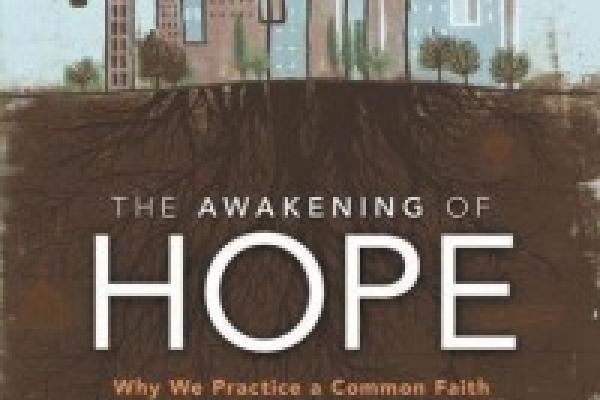Jonathan Wilson-Hartgrove is a modern-day sage. A leader in the New Monastic movement, Hartgrove offers New Monastics and the church at-large profound lessons revealed through the practices of catechism — the spiritual disciplines of Christian faith.
Tempted by the powers of isolation, consumerism, pride, and violence this generation is drawn to the calls to community and simple living for reasons it hardly knows. Wilson-Hartgrove explains the “why."
Through the stories of well-established intentional Christian communities, Wilson-Hartgrove offers windows into the catechisms of the Christian faith. Communion and the Eucharist, fasting, integrity, community, non-violence, and public witness each serve as windows into much deeper philosophical and theological discussions.
Wilson-Hartgrove’s hope comes from a deep grounding in the biblical concept of shalom — though he doesn’t ever name it as such. Grounded in the book of Genesis and woven throughout every book of the Bible, shalom teaches us that we were created in the context of community with God, with each other, and with the rest of creation. We are all connected: our peace is dependent on the peace of all. When we grab at our own peace in our own way — outside of the Jesus Way — then all of the relationships God declared “very good” in the beginning are compromised. In fact, they all come crashing down.
I’ve read and reread many books on the spiritual disciplines. It is the rare one that connects the discipline of Communion and the Eucharist with our God-designed connection to soil, the rest of creation, and to the entire human family. It is the rare book that calls us to understand that we fast, not only to reconnect with our Creator God, but also to connect with those suffering under the weight of violence that our disconnection has caused.
For example, in his chapter on fasting, Wilson-Hartgrove begins not with a focus on physical hunger. Rather, he begins with reflections on the Jubilee Partners community, outside of Athens, Ga. That community’s commitment to simple living (each person lives on only $15 per week) and to loving the stranger (since 1979 they have hosted nearly 4,000 refugees) serves as the frame for Wilson-Hartgrove’s reflections on fasting. Soon, he makes it plain:
By way of fasting you come face-to-face with the truth that eating points to: you are a dependent creature, and you do well to remember it. … We despise our membership in creation and run from communion with Creator. Though a desire as basic as hunger points us toward the life we were made for, we are too easily overcome by the longing to transcend our limits and become something more than we are. (p. 51)
Then on pages 52-53 Wilson-Hartgrove leads us back to Genesis where he reflects on God’s call to refrain from eating from the Tree of the Knowledge of Good and Evil — a fast of sorts and the nature of original sin.
“Fasting is a struggle to the very end,” he says. “To do it is to join your most basic desires with the ancient prayer: ‘Lord Jesus Christ, Son of God, have mercy on me, a sinner.’” (p. 55)
Then Wilson-Hartgrove turns us back toward the "Hope." Referencing Karl Barth he reminds us “To confess our sin is a sign that our bondage to this world’s broken systems has been interrupted. Greed is no longer normal. Violence is not simply reality.” Then Wilson-Hartgrove leads our focus back to the Jubilee Partners community.
It is, instead, a space where fasting from the conventional comforts of American life has clarified vision and sparked imagination for thousands of people. It is no accident that in the 1980’s, when American foreign policy in Latin America was creating refuges who were denied political asylum in the United States, Jubilee Partners dreamed up a network of churches and communities across the U.S. and Canada who would offer hospitality to these homeless victims, pledging allegiance to a higher law of love. (p. 56)
Ultimately, Wilson-Hatgrove explains, “if fasting serves to clarify our vision, it is so we might see this one thing and see it clearly: when fellow creatures suffer, we suffer.” (p. 61)
There is more — much more. In his chapter on “Why we make promises” Wilson-Hartgrove reflects on infidelity, sex, and the “deadening of our sense of intimacy and connection with God” when we “love good things for our own sake.” (p. 70) In his chapter on “Why it matters where we live” Wilson-Hartgrove reminds us of God’s command to humanity in Genesis 1 to multiply and fill the earth and God’s call to Jeremiah to seek the peace of the city to which he was sent and the very incarnation of Jesus on earth and our call to be the “body of Christ." This is why it matters.
Much more than an apologetic for New Monasticism, The Awakening of Hope, offers a window through which Christians can catch a glimpse of the spirit of our faith, reconnect to the deeper philosophical and theological core of our disciplines, and ultimately rediscover what it means to be a follower of Christ.
The Awakening of Hope: Why we Practice a Common Faith
By Jonathan Wilson-Hartgrove
216 pages, Zondervan, $14.99
Lisa Sharon Harper is the director of mobilizing at Sojourners. She is also co-author of Left, Right and Christ: Evangelical Faith in Politics and author of Evangelical Does Not Equal Republican ... or Democrat.
Got something to say about what you're reading? We value your feedback!
